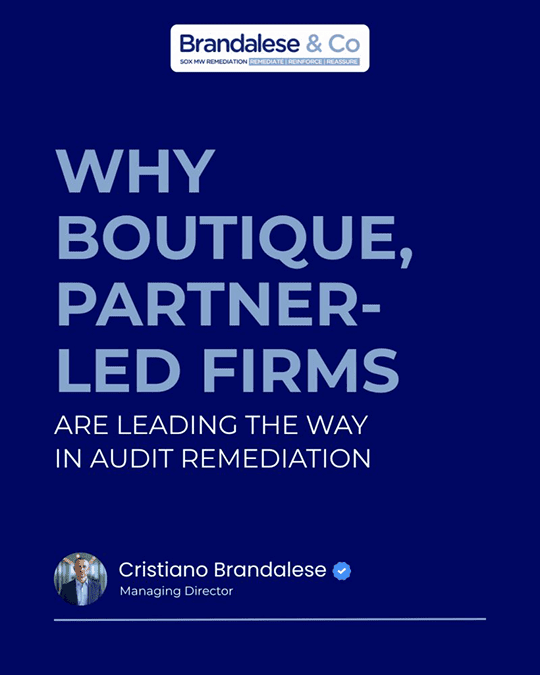In today’s corporate environment, few issues create more urgency—or more anxiety—than a material weakness in internal controls. For public companies, material weaknesses can shake investor confidence, attract regulatory scrutiny, and put leadership under pressure to act quickly and decisively.
The challenge? Fixing a material weakness isn’t just about designing new controls. It’s about ensuring those controls work consistently, meet PCAOB expectations, and can stand up to the scrutiny of external auditors.
Traditionally, companies have turned to large firms for help. The “Big 4” promise vast resources, recognizable brands, and technical credibility. But increasingly, CFOs, CAOs, and Audit Committees are choosing a different path: boutique, partner-led firms.
Why? Because when the stakes are this high, experience, agility, and direct accountability matter more than bureaucracy and overhead.
Partner-Led from Day One
The hallmark of a boutique firm is partner-led delivery.
At large firms, engagements often begin with senior partners in the sales pitch—but once the contract is signed, the work is handed off to layers of juniors and rotating staff. That can mean weeks of ramp-up time, inconsistent quality, and answers that need to be “checked with leadership” before they can be trusted.
In contrast, boutique firms bring experienced leadership to the table from the start. Every discussion, design decision, and remediation strategy is guided by senior professionals who have been through the process many times before.
This direct involvement ensures:
- No learning curve at your expense
- Practical, real-world solutions instead of textbook fixes
- Confidence under pressure, when deadlines are tight and auditors are demanding
When you’re trying to close a material weakness before your next 10-K, the difference between a junior-led and partner-led engagement isn’t just convenience—it can be the difference between success and failure.
Consistent Talent, Faster Execution
Another major advantage of boutique firms is consistency.
Large firms often rotate staff throughout an engagement, leading to knowledge gaps, repeated explanations, and inefficient execution. By the time juniors are up to speed, they’re often reassigned—leaving clients frustrated and paying for time that doesn’t move the ball forward.
Boutique firms keep teams lean and focused. The professionals who start the engagement are the same ones who finish it. That consistency translates directly into:
- Faster ramp-up: No time wasted bringing new people up to speed
- Better communication: A single, stable team that knows your business and your risks
- Quicker problem-solving: Direct access to experienced professionals who don’t need to “check with the team” before making decisions
In short, boutique firms eliminate the inefficiencies that plague large organizations. That speed can mean faster closure of findings—and a quicker return to investor and auditor confidence.
Big 4 Thinking, Boutique Delivery
Choosing a boutique firm doesn’t mean sacrificing expertise. In fact, many boutique leaders are former Big 4 partners and senior managers who have led large-scale remediation efforts in high-pressure environments.
What you get is the best of both worlds:
- The technical depth and rigor you’d expect from a global firm
- The agility, focus, and efficiency that only a boutique can deliver
And you get it without the inflated costs, bureaucracy, or endless delegation that often accompany Big 4 engagements.
That’s why many CFOs and Audit Committees are asking a simple question: Why pay more for slower, less consistent results?
Focused. Agile. Client-Centered
One of the greatest strengths of boutique firms is their ability to adapt.
Large firms often have rigid methodologies and standardized playbooks. While those approaches provide consistency, they can also slow things down and fail to address the unique needs of each client.
Boutiques, on the other hand, design solutions that are customized, practical, and sustainable within your specific operating environment. They don’t bring an army of consultants—they bring a laser-focused team that can pivot quickly as your needs evolve.
This agility means boutique firms can:
- Respond faster to auditor feedback
- Adjust frameworks quickly when business conditions change
- Stay tightly aligned with your goals and deadlines
And because they’re not juggling massive rosters of clients across industries, boutiques keep their focus where it belongs: on you.
Why This Matters in Material Weakness Remediation
Material weakness remediation is one of the most complex areas of SOX. It demands not just technical know-how, but judgment, leadership, and the ability to manage multiple stakeholders—from control owners to external auditors.
Getting it wrong can lead to repeat findings, higher audit fees, and reputational damage. Getting it right restores confidence, strengthens compliance, and allows leadership to refocus on growth.
That’s why the partner-led, boutique model is gaining ground.
It ensures that the people making the critical decisions are the same ones who understand PCAOB expectations, have negotiated with auditors, and know how to deliver solutions that last.
The Future of Audit Remediation: Boutique Leadership at the Center
As the regulatory environment grows more complex and companies face increasing scrutiny over their internal controls, the demand for specialized, senior-led remediation support will only grow.
Big 4 firms will always have their place. But when it comes to high-stakes remediation, more companies are realizing that size isn’t everything. What matters is:
- Direct access to senior expertise
- Consistent, focused delivery
- Efficient execution at the right cost
In other words, boutique firms are positioned to lead the way.
Final Thoughts
Fixing a material weakness isn’t about appearances. It’s not about having a big-name firm on your side—it’s about having the right people in the room, asking the right questions, and designing solutions that work.
- Boutique, partner-led firms offer exactly that:
- Partner-led from day one
- Consistent talent for faster execution
- Big 4 expertise without the Big 4 baggage
The result? Controls that are efficient, sustainable, and capable of withstanding the toughest auditor scrutiny.
So, the next time you’re faced with a material weakness, ask yourself: Do you want to navigate it with a rotating cast of juniors and layers of bureaucracy—or with the senior leaders who know how to deliver results?



